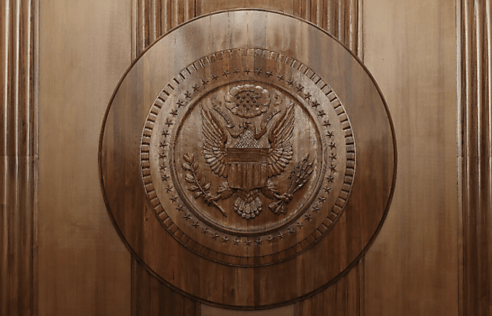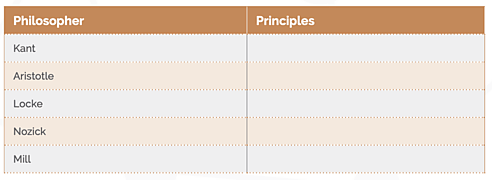Overview
Students will analyze and evaluate the extent to which prosecutorial discretion and progressive prosecutors protect and promote the virtue of citizens.
Students will analyze and evaluate the extent to which prosecutorial discretion and progressive prosecutors protect and promote the virtue of citizens.

Figure 5: Seal of the United States of America on a Courtroom Door in the Robert N.C. Nix Federal Building in Philadelphia. (Carol M. Highsmith, Photograph, 2007, Pennsylvania.)
Recommend completing Lesson 8 in this unit: Mass Incarceration
Step 1: Have students independently consider what they have learned so far about the criminal justice system.
Step 2: Ask students to think about the common thread of civil rights and civil liberties in the cases they have read about. Pose to them this prompt: What role does the criminal justice system play in protecting and promoting the virtue of its citizens?
Step 3: Have students independently write their answers in no more than 5 sentences. Let them know that they will have an opportunity to come back to this and share ideas with their classmates at the end of the lesson.
Step 1: Have students in groups of 5 read the ethics of Immanuel Kant, Aristotle, John Locke, Robert Nozick, and John Stuart Mill. Ask each student to choose one philosopher to read about, and then have them fill out the table in Handout 1.
Step 2: After they complete the table, have students share with one another in their own words how each philosopher defined morality and principles of ethics.
Step 3: Share with the class the question posed by philosopher Michael Sandel in his book Justice: What’s the Right Thing to Do?: “Does a just society seek to promote the virtue of its citizens?” Ask the students how this question might be answered by the philosophers they just read about.
Step 4: Explain to students that this question is at the heart of the progressive prosecution debate in America and has dominated criminal justice reform debates about discretion in sentencing.
Share that in Sandel’s book, he notes from a Kantian perspective that “the principles of justice that define our rights should not rest on any particular conception of virtue, or of the best way to live.”
Sandel also mentions that one way of framing prosecutorial discretion among progressive prosecutors is to adopt a utilitarian lens seeking to “maximize welfare.” Deliberate choices to deprive individuals of their liberty must be weighed with an eye to preventing greater societal harm. Sandel brings into focus the moral quandary of hypothetical societal gains against the known harm to the individual. Prosecutors who choose a progressive path must commit to moral persuasion and to a public debate about justice and rights rather than specific ideology. As Sandel notes, “When moral reflection turns political, when it asks what laws should govern our collective life, it needs some engagement with the tumult of the city, with the arguments and incidents that roil the public mind.” Sandel articulates the most persuasive starting point for progressive prosecutors: “Is morality a matter of counting lives and weighing costs and benefits, or are certain moral duties and human rights so fundamental that they rise above such calculations?”
Sandel’s review of the Aristotelian system of morality provides a final philosophical warrant for progressive prosecutors. Sandel highlights two central Aristotelian premises: 1) justice is teleological (defining rights requires us to figure out the telos of the social practice in question [(e.g., incarceration]); and 2) justice is honorific (to reason about the purpose or “telos” of a practice is, at least in part, to reason or argue about which virtues it should honor and reward). Moral virtue comes as a result of habit. Mandatory minimums deprive prosecutors and judges of the exercise of practical wisdom (“phronesis”). Aristotle, as Sandel notes, believed that “practical wisdom is a moral virtue with political implications” (in this case, building political consensus for criminal justice reform).
Step 1: Explain to students that in the next lesson they are going to take a deeper dive into the debate around progressive prosecutors, prosecutor misconduct, and prosecutorial discretion. Say that for now they are going to circle back to their warm‐up question on what role the criminal justice system plays in protecting and promoting the virtue of its citizens.
Step 2: Ask students to write an essay that draws upon what they have learned so far in this unit and that cites the philosophers’ perspectives to defend their argument.
Step 3: Have students share a Flipgrid or present in class their ideas on the extent to which the criminal justice system plays a part in protecting and promoting the virtue of its citizens.
Step 1: Have students recall their discussion from the previous day. Ask them to use context clues from their prior reading to say what they think a progressive prosecutor is.
Step 2: Have students share their answers. Then, explain to students that a progressive prosecutor is part of the progressive prosecution model that is “committed to truth‐telling about systemic racism, shrinking mass criminalization, addressing root causes of crime, and bringing the criminal legal system in line with basic notions of justice and humanity.”
Step 3: Tell students their goal in this lesson is to connect their understanding of the underlying question of Sandel to the model of progressive prosecution to identify the extent of prosecutorial discretion.
Step 1: Explain to students that in 1935, a pivotal case known as Berger v. United States was decided. Instruct students to work in their same group of 5 from the previous day to break up the reading of “‘Hard Strikes and Foul Blows’: Berger v. United States 75 Years After” by Bennett L. Gershman. Encourage students to annotate the text.
Step 2: Have students fill out the table in Handout 2.
Step 3: Ask students to return to whole class discussion to share their findings after completing the reading and table.
Step 1: Share with students that they are going to apply their understanding of prosecutors and prosecutorial discretion to analyze the perspectives on the arguments surrounding progressive prosecuting.
Step 2: Have students work in their groups to analyze the arguments in the following articles and fill out the table in Handout 3:
Step 3: Ask students to explain the different arguments as a class. Follow up and ask them to explain in a round robin one thing that was surprising, troubling, or interesting about the arguments.
Optional break if not on block schedule
Engage students in discussion about progressive prosecutors. Prompt students with the following questions: What is the extent of prosecutorial discretion? To what extent do progressive prosecutors protect and promote the virtue of citizens in society?
Remind students of the framework of civil discourse for healthy discussion habits.
Tell students that in their group they will create a slide deck on how each of their philosophers would respond to the role of progressive prosecutors. Have students highlight their interpretation of the ethics of the philosophers and how it relates to the broader conversation of progressive prosecutors and prosecutorial discretion in protecting society.
Ask students to share with a partner whether or not their opinion has changed since the discussion in the prior lesson about the criminal justice system.


